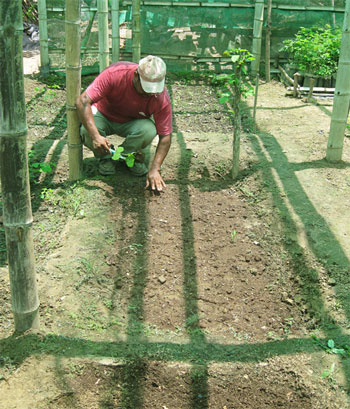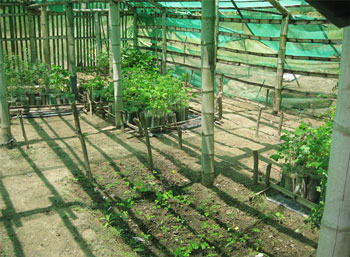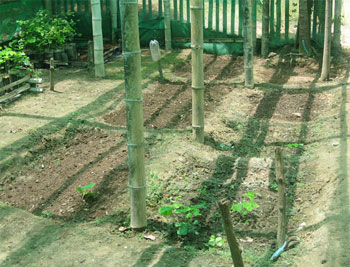March 4-April 7, 201
Things have slowed considerably volunteer-wise the past month, but there is a recent new arrival, Chris, from Germany, and more arrivals slated for the coming weeks. During the past month, Orlando and I have managed to keep things running on our own. The rainy season appears to be slowly making its exit, and the dry season is creeping in. Fortunately there have been enough drizzles and light rains recently to keep all the plants and hillsides a vibrant green.

Work has covered multiple areas. We’ve had to do some spot watering at the University Catolica revegetation site, for the Pechiches and Chirimoya (both native fruit) trees. There’s been weed clearing on trails and around trees there as well, since some areas hadn’t been visited in over a month.
We’ve also planted more (20) trees at a site from last year behind the cemetery. And a new site is being created in Jorge Lomas, also in an area where we worked last year. The land owner there, Don Carlos Salazar, is very keen on continuing to participate in the revegetation project. His land is on a fairly steep mountain side that has only sparse tree vegetation. It is a little late in the season to be adding sites, but we still have trees in the greenhouse, and Don Carlos has a cistern with water that we can use to water the trees. Last year we planted 470 trees, which are doing great. This year we will plant a couple hundred more.
Ramon and various visiting groups of volunteers from the Global Student Embassy organization have planted 1,300 trees at Ramon’s family land at Punta Gorda in the past month. Two more groups of volunteers will visit and they are asking for even more trees to plant. We will send out another truckload. They are revegetating strategic areas in the forest at Punta Gorda around and near water drainages, which retain moisture throughout the dry season. They will hopefully only need a minimal amount of extra watering. So far the planting is going very well.
Also, Orlando has been contacted by individuals interested in receiving trees. Several of them want to be responsible for the entire process of transporting, planting and caring for the trees. They have agreed to let us check in periodically on the work to make sure that they really do their part.

At the greenhouse we have been consolidating the space we occupy since nearly 3,000 trees have been delivered and planted so far this year. Black plastic lining was collected and washed off. Weeds were pulled and macheted. Compost was turned. Seed beds of Pechiche, Guachepeli, Cabo de Acha, Balsa and Chirimoya were planted and so far Pechiche and Guachepeli are already germinating.
On the side, we’ve been collecting 3-liter bottles, since the trees for next year are already popping up and soon we will need thousands more bottles for storing trees.

In other news, we are making preparations to give away the remaining 300 fruit trees at the greenhouse on Earth Day.
And finally, funding for 3 more classes of Bioregionalismo has been secured from the Canadian foundation, Children of Ecuador, and classes will begin in May. Preparations for the 12 week after school program for 11-13 year olds are underway with the teachers: Ramon, Margarita and Nadine.
We look forward to receiving more volunteers in the coming months and progressing with the revegetation project and bioregional education program.
Pásalo bien,
Clay

Your article helped me a lot, is there any more related content? Thanks!
Your article helped me a lot, is there any more related content? Thanks!
I don’t think the title of your article matches the content lol. Just kidding, mainly because I had some doubts after reading the article.
Your point of view caught my eye and was very interesting. Thanks. I have a question for you.